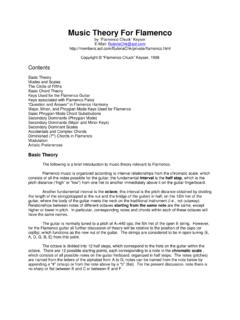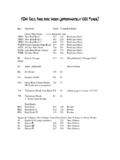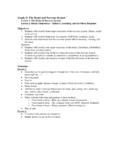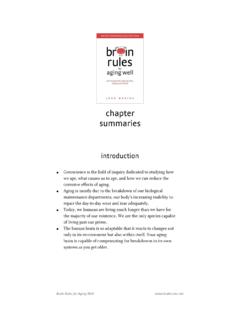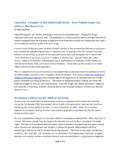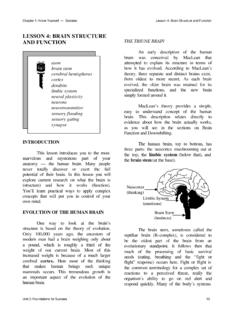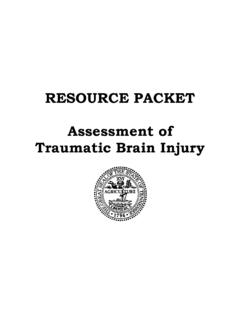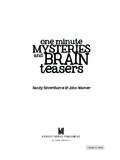Transcription of 2000 KEEP YOUR BRAIN ALIVE - valdez.dumarsengraving.com
1 APR2000 keep YOURBRAIN ALIVE83 Neurobic Exercisesto Help Prevent Memory Loss andIncrease Mental FitnessLawrence C. Katz, Manning RubinIllustrations by David Suter3 1150007903129 Workman Publishing Company, New YorkCopyright 1999 by Lawrence C. Katz and Manning RubinIllustrations copyright David SuterCover and book design: Elaine TomAll rights reserved. No portion of this book may be reproduced mechanically,electronically, or by any other means, including photocopying withoutwritten permission of the publisher. Published simultaneously inCanada by Thomas Alien 8c Son of Congress Cataloging-in-Publication DataKatz, Lawrence, 1956- keep your BRAIN ALIVE : the neurobic exercise program/by Lawrence C. Katzand Manning 0-7611-1052-61. Cognition Age factors.
2 2. Cognition Problems, exercises, etc. 3. Memory Agefactors. 4. Cognition Problems, exercises, etc. 5. Aging Psychological Rubin, Manning. II. 1998153 dc21 98-18888 CIPW orkman books are available at special discounts when purchased in bulkfor premiums and sales promotions as well as for fund-raising or educational editions or book excerpts can also be created to details, contact the Special Sales Director at the address Publishing Company, BroadwayNew York, NY 10003-9555 Printed in the United States of AmericaFirst printing May 199910 9 8 7 6 ACKNOWLEDGMENTSWe both thank Peter Workman for being our match-maker, and our editor, Ruth Sullivan, for her steadfastfaith in the project and her relentless pursuit of clarity andsimplicity in the writing and organization of the Katz wishes to thank Doris larovici, his spouse, forher critical insights, advice.
3 And editorial assistance, and BonnieKissell, for unflagging administrative support of this Rubin thanks Jane Rubin, for bearing the bruntof his burying himself in the research, writing, and rewritinghe has been obsessed with for two years, and for her level-headed observations that helped the book. And he thanksLarry for the voluminous work he has produced in keepingthis book ..ixCHAPTER INeurobics: The New Science of BRAIN Exercise ..1 CHAPTER IIHow the BRAIN Works ..9 CHAPTER IIIHow Neurobics IVStarting and Ending the Day ..41 CHAPTER VCommuting ..53 CHAPTER VIAt Work ..7-7 CHAPTER VIIAt the .87 CHAPTER VIIIAt Mealtimes ..99 CHAPTER IXAt Leisure ..117 PREFACEAs the population of over 76 million Baby Boomers ap-proaches middle age and beyond, the issue of preservingmental powers throughout greatly increased life spans hasreached an almost fever pitch.
4 There is a growing interestin and optimism about preserving and enhancing thebrain's capabilities into senior years. With the help of power-ful new tools of molecular biology and BRAIN imaging, neuro-scientists around the world have literally been looking intothe mind as it thinks. Almost daily, they are discovering thatmany of the negative myths about the aging BRAIN are, in-deed, only myths: "Older and wiser" is not just a hopefulcliche but can be the reality. In much the same way that youcan maintain your physical well-being, you can take charge ofyour mental health and new and therefore not yet proved by a largebody of tests, Neurobics is based on solid scientific ground; itis an exciting synthesis of substantial findings about the brainthat provides a concrete strategy for keeping the BRAIN fit andflexible as you grow your BRAIN ALIVEFrom Theory to PracticeJane reached into her pocketbook and fished inside for thekeys to her apartment.
5 Usually they were in the out-side flap pocket but not today. "Did I forget them?!No..here they are." She felt their shapes to figureout which one would open the top lock. It took hertwo tries until she heard the welcome click of thelock opening. Inside the door she reached tothe left for the light but whybother? Her husband would do thatlater. Touching the wall lightly with herfingertips, she moved to the closet on the right,found it, and hung up her coat. She turned slowly and visualizedin her mind the location of the table holding her telephone and an-swering machine. Carefully she headed in that direction, guidedby the feel of the leather armchair and the scent of a vase of birth-day roses, anxious to avoid the sharp edge of the coffee table andhoping to have some messages from her family table.
6 The answering machine. She reached out andbrushed her fingers across what she believed to be the play button."What if I push the delete button?" she thought, and again checkedto make sure she was right. Yesterday it was so easy. She could havePREFACE done all this simply by looking around. Today was different. Shecould see Jane had not suddenly gone blind. At age 50, she wasintroducing a lifestyle strategy called Neurobics into her dailyactivities. Based on recent discoveries in BRAIN science, Neu-robics is a new form of BRAIN exercise designed to help keepthe BRAIN agile and healthy. By breaking her usual homecom-ing routine, Jane had placed her brains attentional circuits inhigh gear. With her eyes closed, she had to rely on her sensesof touch, smell, hearing, and spatial memory to do somethingthey rarely did navigate through her apartment.
7 And shewas involving her emotional sense by feeling the stresses ofnot being able to see. All these actions created new and dif-ferent patterns of neuron activity in her BRAIN which is howNeurobics book will explain the principles behind Neurobicsand how the exercises enhance the overall health of yourbrain as you grow :The New Science ofBrain Exercise(~\ Tf "That was the name of that actor who was in all the earlyV V Woody Alien films? You curly brown ?"The first time you forget the name of a person you shouldknow, a movie title, or an important meeting, you're likely toexclaim only half-jokingly "I'm losing it! My BRAIN isturning to Jell-O." Reinforced by messages and images in themass media, you equate mild forgetfulness with the firststages of accelerating mental decline.)
8 "..He was just in a Broadway show with, um, what' , God, you know who I mean."And maybe they do remember it's Tony Roberts. But if theydon't, you become frustrated and preoccupied trying to recallthis buried name. Usually beginning in your forties or fifties sometimes even in your thirties you start to notice thesesmall lapses: not remembering where you put the car keys orKEEP your BRAIN ALIVE what was on the grocery list you left at .or being unableto understand the instructions for a new VCR or com-puter..or forgetting where the car is parked because you leftthe mall through a different though these small lapses don't actually interferemuch with daily life, the anxiety they provoke can. You worrythat you'll become just like your Aunt Harriet, who can re-member details of events from the Depression but not what shedid yesterday.
9 Firsthand experiences with people who have dif-ficulty with perception and memory as they age can make youanxious when you suddenly forget something ordinary. Nowonder you jump to the conclusion that aging is an inevitableslide into forgetfulness, confusion, or even the first stages ofAlzheimer's good news, however, is that mild forgetfulness is nota disease like Alzheimer's and action can be taken to combatit. Recent BRAIN research points to new approaches that canbe incorporated into everyday activities to develop and main-tain BRAIN connections. By adopting these strategies, you mayactually enhance your BRAIN 's ability to deal with declines inmental are numerous myths about the aging BRAIN thatneuroscientists are disproving daily.
10 With the help of excitingNEUROBICSnew technologies, the traditional view of the way the brainages is being rapidly revised. Evidence clearly shows that thebrain doesn't have to go into a steep decline as we get fact, in 1998, a team of American and Swedish scientistsdemonstrated for the first time that new BRAIN cells are gener-ated in adult contrary to popular belief, the mental decline mostpeople experience is not due to the steady death of nerve , it usually results from the thinning out of the numberand complexity of dendrites, the branches on nerve cells that di-rectly receive and process information from othernerve cells that forms the basis of memory. Den-drites receive information across connections calledsynapses.
